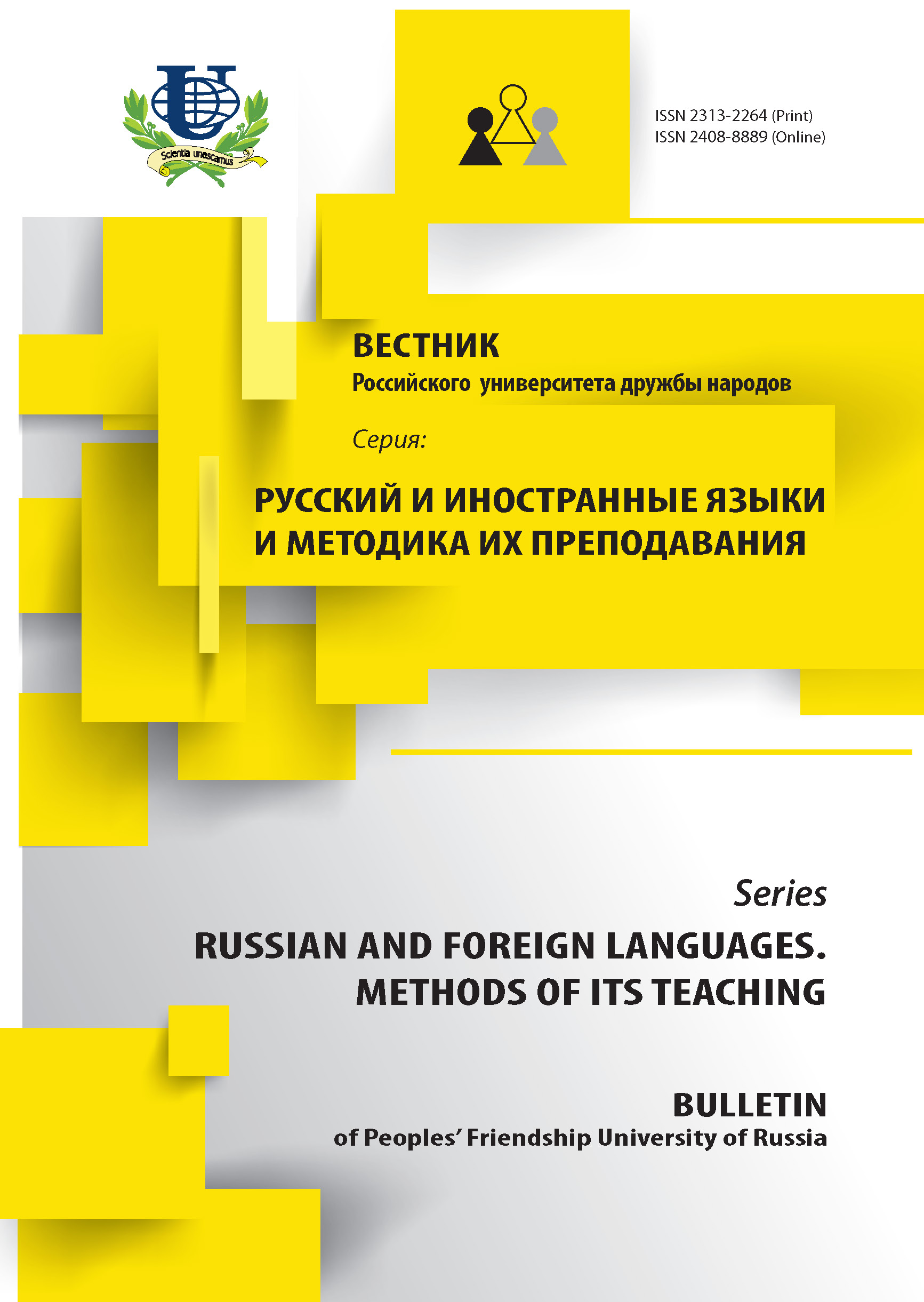No 2 (2010)
- Year: 2010
- Articles: 15
- URL: https://journals.rudn.ru/russian-language-studies/issue/view/614
Articles
 5-11
5-11


The synonymy of idiom sentences in the artistic text
Abstract
The article is considering the synonymy of simple idiom sentences meaning «the higher degree of quality and quality estimation» and complex idiom sentences with time relations between parts in the works of Russian writers. Structural, semantic and functional features of synonymic idiom sentences and the peculiarities of these synonymic lines have been revealed.
Russian Language Studies. 2010;(2):12-15
 12-15
12-15


 16-20
16-20


The sphere of military concepts and the concept of «blank weapon (sword)» in the language picture of the world of the russians in comparison with other linguistic cultures
Abstract
This article is devoted to the sphere of military concepts and the concept of «blank weapon (a sword). The entity of this concept and symbol and its features are being defined in the article. We are also investigating the evolution of the concept.
Russian Language Studies. 2010;(2):21-28
 21-28
21-28


Verbalization peculiarities of the sphere of concepts of «personality speech behaviour» in the system of nominative units of the russian language
Abstract
In the article verbalization peculiarities of the sphere of concepts of «Personality speech behaviour» in Russian vocabulary notably in the system of nominations of the Russian language are considered with the help of analyzing fundamental concept names of communicative personalities, defining their system connections and initial identification of their content and structure.
Russian Language Studies. 2010;(2):29-37
 29-37
29-37


Non-verbal discourse in structure of speech and behaviour potential of communicant
Abstract
The author analyzes nonverbal dialogical fragments of art prose from the point of view of realization verbal (Language behavior) (rechepovedenchesky) potential of the addressee in them developing under influence of «the factor of a speaking person (speaker)».
Russian Language Studies. 2010;(2):38-44
 38-44
38-44


The term 'synonymic and varied row' (to define metalanguage of functional and communicative grammar of russian language)
Abstract
This article is devoted to the new linguistic term 'synonymic and varied row' that has been recently introduced in the functional and communicative grammar. Our research is based on the material of Russian temporal adverbs. Here we try to reveal certain criteria for choosing correct adverb in the certain context and illustrate how it works.
Russian Language Studies. 2010;(2):45-51
 45-51
45-51


Linguistic characterisitics of the images of justiciaries in russian fables of XVIIIth - XXth centuries: linguocultural analysis
Abstract
The article labors the main language units used to create images of justiciaries in Russian fables. As it is shown in the article, the choice of different units depends not only on individual manner of writing, but also on social and historical conditions. The genesis of fable stereotypes is described in connection with their usage in Russian folklore.
Russian Language Studies. 2010;(2):52-57
 52-57
52-57


 58-65
58-65


 66-70
66-70


Common solid speech errors made by students in their polish classes
Abstract
It deals with a classification of common solid errors made by students in grammar constructions of the Polish language and it provides the information that learners need to correct their grammar errors. Moreover, it states the necessity to work out not Polish but Polish and Russian grammar rules based on the comparison between the mother tongue and a foreign language.
Russian Language Studies. 2010;(2):71-78
 71-78
71-78


Artistic text in teaching russian as a foreign language to foreign students non-philologists at the elementary level
Abstract
In this article we present a project of a manual on Russian as a foreign language based on artistic texts. We also propose principles of adaptation of the artistic text for the cultivation of speech skills at the elementary level and exercises oriented on the state education standards. The authors rest upon their practice of teaching foreign students.
Russian Language Studies. 2010;(2):79-84
 79-84
79-84


The causes of 'blank spots' on the map of contemporary linguistics
Abstract
This paper reveals the causes of the decrease of the research interest to some realms of present-day linguistics. These are difficulties to chart the subject of research (while taking into consideration some parameters like age, gender, occupation and others), privacy limitations, the shortage of appropriate concepts, unfashionable genres, inattention to some fascinating trivia.
Russian Language Studies. 2010;(2):85-94
 85-94
85-94


The problem of veto processes in folk menthality and dialect speech
Abstract
This article deals with veto processes (forbidden words) in the vocabulary of folk medicine on the basis of phonetic corpus of south-western patois of Bryansk region. The author is convinced that many scientific medical terms trace back to folk sources, and this fact is confirmed in the conducted research of the material of this thematic group.
Russian Language Studies. 2010;(2):95-101
 95-101
95-101


Our Autors
Russian Language Studies. 2010;(2):102-103
 102-103
102-103















